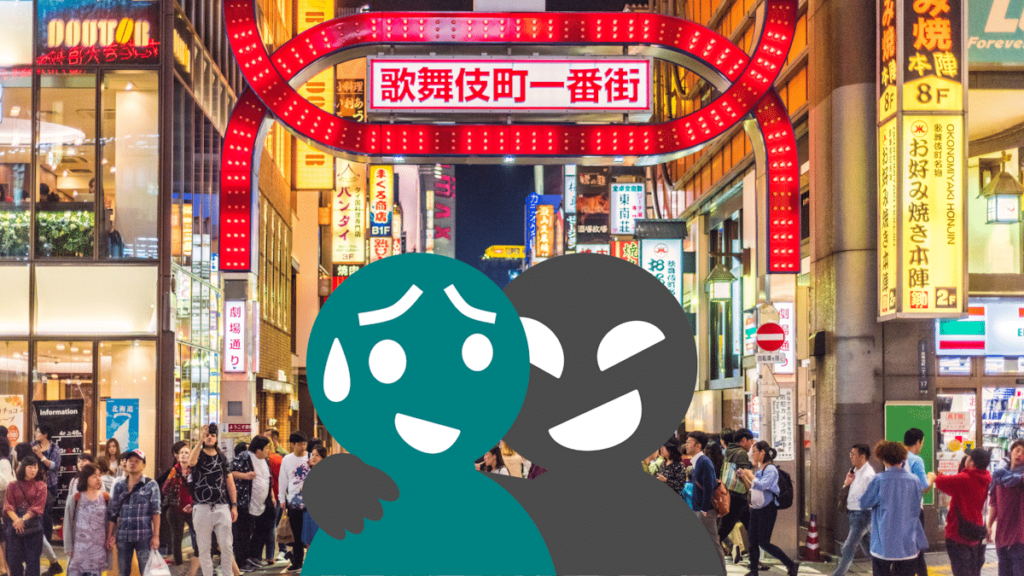[ad_1]
If you’ve traveled to Japan – and, particularly, if you’ve gone to Kabukicho or a similar red light district – you’ve likely been hailed down. At least one person has tried to invite you to an izakaya, girl’s bar, or similar establishment.
As tourism to Japan spikes, these illegal barkers (touts in UK English) are becoming an increasing – and annoying – problem. Here’s why police enforcement hasn’t been effective – and why you should avoid barkers in Japan at all costs.
Barkers are illegal…

In Japanese, barker or tout activity is called 客引き (kyaku-hiki). Barkers are regulated under Japan’s Businesses Affecting Public Moral Regulations Act, or the Entertainment Law (風営法; fuueihou). Various prefectures and cities in Japan also have their own additional regulations on top of the Entertainment Law.
The Entertainment Law regulates kyaku-hiki, defining it as when a representative for a store calls out a specific person in a crowd and singles them out to invite them in. This can include following the person, blocking their walking path, or grabbing them to prevent them from leaving.
In Japanese, a person performing kyaku-hiki is called the “catch” (キャッチ). There are also scouts (スカウト), who try to round up workers for a nightlife business. This might be anything from a concept cafe to (more often) one of Japan’s legal sex-service establishments, such as a soapland. Many target people desperate for money, such as women who’ve racked up huge host club debts.
Legally, kyaku-hiki is distinguished from yobikomi (呼び込み), or “calling in.” Yobikomi consists of holding billboards, calling out to people generally (e.g., shouting “Please come in!” or a slogan for a business), or distributing advertising leaflets or tissue packets.
Advertisements
Yobikomi is fine and legal. On any given night around Kabukicho or Ikebukuro, you’ll see troupes of maids and other concept cafe cast holding sandwich boards advertising their introductory prices.
Catching and scouting, however, are strictly illegal and carry stiff penalties. An individual in Tokyo may be fined 500,000 yen (USD $3,177) per incident. A business owner may be hit with a fine of 1 million yen (USD $6,355) or even thrown in jail for up to six months.
….but that doesn’t stop them
Go to Kabukicho in Tokyo or Susukino in Sapporo on any given night, however, and someone will eventually target you. They may try to get you to enter an izakaya (small plates and drinks) bar, or maybe a girl’s bar (where female bar staff serve drinks and chat with clientele), a host club, or a similar nightlife business.
Why do this? In most cases, it’s because that specific business is, at its root, shady. Many aim to lure customers and stiff them with exorbitant drink fees and hidden “service charges.”
(Note this isn’t a general statement about izakaya, girl’s bars, etc. There are many legitimate ones that are up-front about their pricing structure.)
While kyaku-hiki is a crime, it’s one police don’t pursue unless (1) they witness the crime first-hand or (2) it’s a flagrant case that involves following or physically obstructing a potential customer. Businesses that use kyaku-hiki also try to distance themselves from their relationship with catches by sharing a pool of part-time workers who get paid on a commission basis. This makes it harder to crack down on chronic violators, as stores can deny their affiliation with a catch who got caught.
As a result, police enforcement against kyaku-hiki is thin. After Nagoya passed a stricter anti-barker ordinance, it received 160 complaints. However, out of those 160, it only made one arrest.
As for the catches, while the work is risky – especially for foreigners here on a visa – it’s also lucrative. Many catches earn both a flat fee for each customer as well as a commission (10-20%) on whatever the customer spends that night. Given the lackluster police enforcement, that makes the job high profit and relatively low risk. It’s no wonder the practice still abounds.
Police step up anti-barker campaigns

It can be fun to bar crawl around the rambunctious areas of a city and live it up until the wee hours. However, the proliferation of insistent barkers can make areas such as Kabukicho an unpleasant experience for locals and tourists alike.
As a result, several cities are making additional efforts to crack down on the practice. On June 13th, Osaka police set up special patrols to warn visitors to the Umeda Shopping District not to follow catches.
Police also raided several so-called “Free Guidance Centers” (無料案内所; muryou annaijo), or shops that introduce customers to cabaret clubs, girl’s bars, soaplands, and other nightlife/sex services. Most of these centers are legal businesses that legitimate bars, clubs, and sex spots use as advertising. However, some operate as scam fronts without the appropriate paperwork needed for such a business.
Other municipalities are using technology to see where the cops can’t. In Sannomiya in Kobe, the city has installed security cameras attached to real-time processing software. If the system detects barker behavior that seems to violate the law, it issues a warning from a loudspeaker.
Don’t follow the barkers!

Many businesses in Japan’s red light districts are legal. But more than a few operate without proper licensing or are just outright scams.
As a rule of thumb, never enter a store that employs barkers. If a restaurant or bar is willing to break the law before you even enter, chances are it’s a scam from top to bottom.
In general, it’s better to stick to mainstream businesses that have good reviews online – e.g., large maid cafe chains with good reviews on Google Maps. You can get adventurous and check out other stores if they seem to be advertising legally and following the rules. Or, you can consult a tour guide to create an itinerary of locations the company knows and trusts.
Sources
客引きをすると違法?~刑事処分だけでなく行政処分も. Nagoya Law Office
「ガールズバー」の『違法な客引き』許さない 警察が体制強化 「無料案内所」への行政指導も実施. FNN Prime Online
風俗案内所の営業を始めるにはどうすればいい!?風営法専門の行政書士が解説. Aruto
悪質な客引き対策 神戸・三宮でAI機防犯カメラ設置. Sun TV News
[ad_2]
Source link




